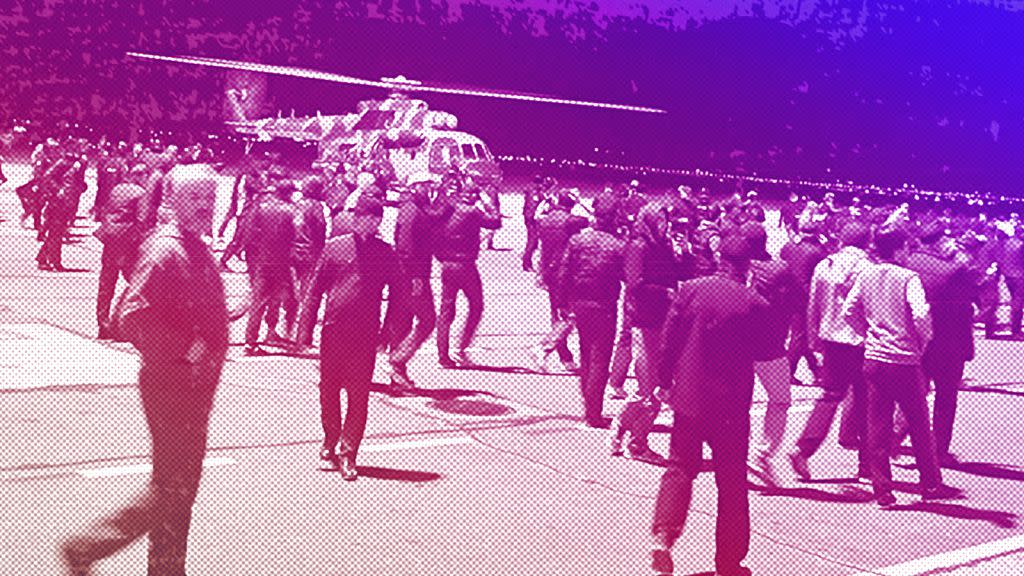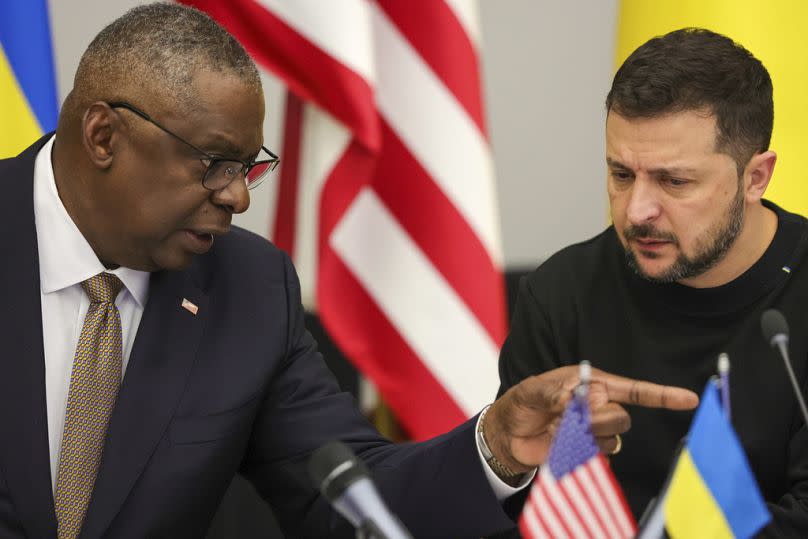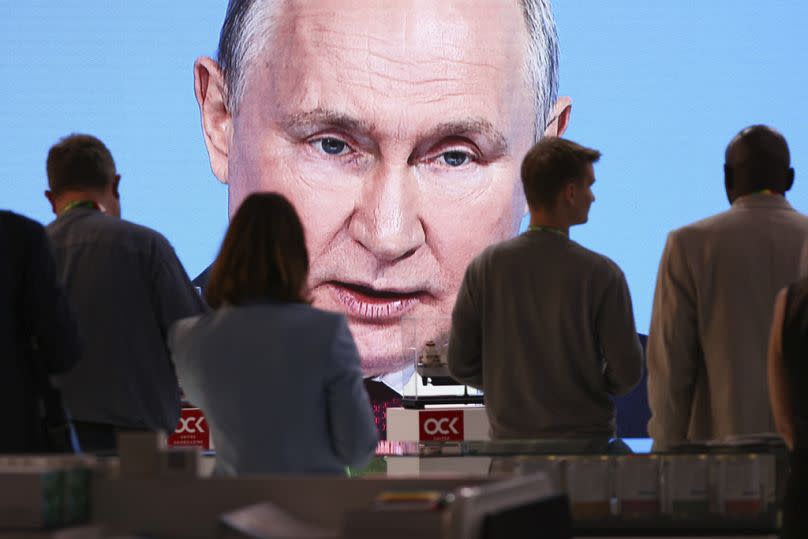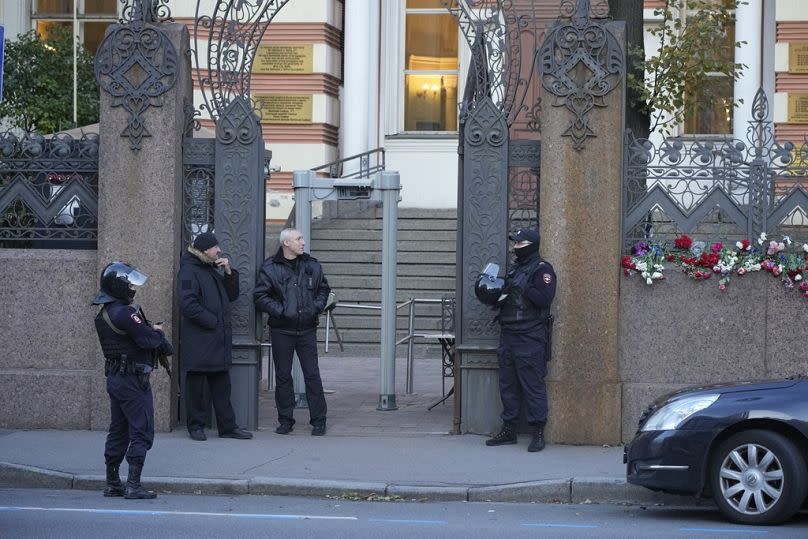The Kremlin fuelled antisemitism at home. Then it blew up

Islamophobia and antisemitism have been on the rise worldwide since the beginning of the Hamas-Israel conflict.
Both stem from two general kinds of racism: the grassroots one, which tends to originate in parts of society at the base level, and the top-down one, which is spread from those in power and their exponents.
As such, top-down racism is unthinkable in our day and age, as it would go against the basic moral principles of contemporary democratic societies.
On the other end of the political spectrum, autocratic leaders more often than not intentionally instrumentalise historical divisions in their societies — including ethnic, religious, racial or class ones.
Dictators strive to profit from tensions in society in order to prevent various societal groups from uniting against their rule. Autocrats tend to know when and exactly how to stir and agitate certain social groups when they believe it's necessary.
Yet, sometimes these actions spiral out of control and produce unwanted results. That was the case with the recent anti-Jewish riot — labelled by some as a pogrom — at the Dagestan international airport.
Debating Zelenskyy's heritage to back talk of 'Ukrainian Nazis'
Ever since the beginning of the full-scale invasion of Ukraine, the Kremlin has not shied away from stirring up anger and contempt against those of Jewish background or Jewish identity in general.
The dominant discourse spread by Moscow's power circles has been marked by a key talking point that can be summarised as “the Anglo-Saxons (meaning, the West) have installed a Jewish puppet — who’s not even Jewish in a fundamental sense — in Kyiv to cover up the contemporary Ukrainian Nazism."
This toxic notion has been thoroughly debunked, yet, this is almost exactly what Russia's Vladimir Putin said on 5 September, just two months before the antisemitic lynch mob stormed the airport in Dagestan’s capital Makhachkala.

“Western curators put at the head of contemporary Ukraine a person — an ethnic Jew, with Jewish roots, with Jewish origins. And thus, in my opinion, they seem to cover up a certain anti-human essence, which is the foundation, the basis of the modern Ukrainian state,” Putin said.
With the Kremlin's supposed “denazification” of Ukraine as the ideological basis for the legitimisation of its invasion of a neighbouring country, Putin has in fact repeatedly questioned Ukrainian President Volodymyr Zelenskyy’s Jewish identity while also using it against him.
“I have had many Jewish friends since childhood. They all say, 'Zelenskyy is not Jewish, he is a disgrace to the Jewish people' … Zelenskyy is a man of Jewish blood. Yet with his actions, he covers up these neo-Nazi monsters,” Putin said earlier in June.
Licence to kill
On 22 October, a week before the Dagestan’s international airport rampage, a well-known state propagandist, Dmitry Kiselev, said on state TV that “antisemitism is a cultural norm for hundreds of millions of Muslims, passed on from one generation to another. And no amount of political correctness can do anything about it.”
This statement is indeed both Islamophobic and antisemitic. However, the same Russian state TV channels have, like the Kremlin, papered over their latent Islamophobia by taking a clear pro-Hamas position and placing tradition at the cornerstone of politics. This is why these kinds of messages were easily interpreted by some in the Northern Caucasus — a traditionally Muslim-majority region — as a way to legitimise hate and declare an open hunt on Jewish people.

It is also clear why the instigators believed there would be no pushback from the authorities, and why they ended up being treated much more leniently than Russian anti-war protesters, for example. Why would a country, which supports Hamas and claims that antisemitism is "tradition", persecute them if they embarked on an antisemitic campaign? And isn't this undertaking essentially just a fervent display of support for the state?
How much does Russia stand to benefit from turmoil in the Middle East?
The Israel-Hamas war is the latest proof Russia is a global agent of chaos
Besides official ties of the Russian leadership with Hamas, the mainstream media discourse in Russia has been clearly anti-Israel ever since Hamas' militants organised and conducted a massacre of Israeli civilians on 7 October.
There wasn’t a single statement denouncing Hamas as an extremist or terrorist organisation in the Russian state media — only calls for an independent Palestinian state and accusations against Israel of cynically murdering Palestinian civilians.
Setting things on fire and blaming the US
All of this is quite the opposite of responsible Western leaders, intellectuals and media pundits who always make it clear that the Hamas militants committed a horrible act of violence while voicing their legitimate concern for the protection of the Palestinian civil population.
This is the only way to combat antisemitism and send a clear message to society: terrorism is not acceptable under any circumstance, and any violent act or hate speech incident against Jewish citizens in the democratic world will be severely persecuted in accordance with the law.

This, of course, doesn’t mean that protests in support of Palestine and Palestinians are or should be stigmatised. In fact, it means that there simply has to be a clear dividing line between propagating Hamas’ terrorism and supporting Palestinians.
Such a clear line was never drawn in Russian media. Instead, the Russian state sent a direct, malignant signal inciting its already highly antisemitic and intolerant society: “Jews are Nazis in Ukraine, and they are now intentionally killing Palestinian children”.
So if you were just a regular consumer of mainstream TV content in Russia, you would end up believing that taking the fight to nominally Jewish passengers of a flight from Tel Aviv that had landed in Makhachkala is a patriotic act in every possible sense.
In the end, Putin blamed the US for an easily anticipated explosion of antisemitism in Russia. “It is necessary to know and understand where the root of evil is, that spider who is attempting to wrap the entire planet, the entire world, into its web,” he said after the Dagestan riot.
Yet, the responsibility for the hate lies squarely on Putin and Russia. Russian propaganda has been demonising Ukrainians for almost a decade. Now it’s the turn of Russia’s Jewish population to be stigmatised, just like it was many times through history. And if Putin keeps having it his way, in the end, there will be no one left to hate.
Aleksandar Đokić is a Serbian political scientist and analyst with bylines in Novaya Gazeta. Formerly, he was a lecturer at RUDN University in Moscow.
At Euronews, we believe all views matter. Contact us at view@euronews.com to send pitches or submissions and be part of the conversation.

 Yahoo News
Yahoo News 
